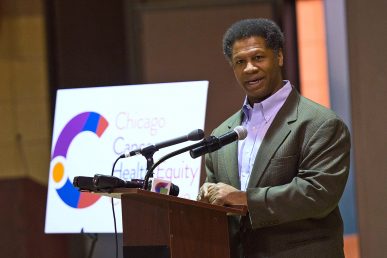‘Cancer is like a hurricane,’ but community can help
Candace Henley, 36, was rushed to the emergency room with severe bowel blockage but physicians thought she was too young to have colon cancer and didn’t test her for it. The single mother of five young girls didn’t know enough about the disease to ask to be tested.
It wasn’t until her third ER visit – six months after her first – that a physician finally gave her a fecal blood test. They later found a cancerous tumor the size of a grapefruit, and removed 90 percent of her colon.
“[I said], ‘Lord, if you just allow me to live until [my youngest daughter of 4] turns 18, I won’t ask you for anything else,'” Henley said. “‘But in return, I will tell everybody about colon cancer … I will do anything and everything I can to save somebody else’s life from this disease.'”
On Friday, Sept. 22, Henley will carry out that promise as she delivers the keynote speech at a community forum led by the Chicago Cancer Health Equity Collaborative, or ChicagoCHEC, a National Cancer Institute-funded initiative to reduce cancer inequities in Chicago’s low-income neighborhoods.
The event, which is free and open to the public from 9 a.m. to 2 p.m. at Arturo Velasquez Westside Technical Institute, 2800 S. Western Ave., is ChicagoCHEC’s second annual community forum.
The forum will provide a detailed look at the ongoing work of the ChicagoCHEC partnership, led by researchers from the University of Illinois at Chicago, Robert H. Lurie Comprehensive Cancer Center of Northwestern University and Northeastern Illinois University.
According to data from the Illinois Department of Public Health, low-income Chicago communities that are predominantly African-American or Latino face cancer death rates up to double the national average.
“The cancer disparities we see in Chicago stand as a clear call to action,” said Marian Fitzgibbon, one of the principal investigators on the ChicagoCHEC grant and associate director of health equity and community engagement at the University of Illinois Cancer Center. “Only by working together and through authentic engagement can we create meaningful change and reduce the unequal share of the cancer burden felt by vulnerable communities.”
“We have established an innovative, comprehensive partnership to foster meaningful cancer research, education, training and outreach across the Metropolitan Chicagoland area,” said Dr. Melissa A. Simon, the George H. Gardner Professor of Clinical Gynecology in Obstetrics and Gynecology at Northwestern University Feinberg School of Medicine and co-director of the Lurie Cancer Center’s Cancer Control and Survivorship Research Program. “Our goal is to transform how community engagement and research are conducted, thus changing the architecture of how we collectively improve health equity.”
“Our community outreach successes would not be possible without the guidance, engagement, and continued commitment from our community partners in our efforts to reduce barriers around access to cancer preventive services and treatment,” said Moira Stuart, associate professor of health, physical education, recreation and athletics at Northeastern.
“For me, cancer was a hurricane,” Henley said. “It hit my life and I’ve been rebuilding it ever since.” She said her community of friends and family offered her a place to live when her house went into foreclosure, made sure she was taking her medicine and helped her pay her bills when she couldn’t work.
“Community is extremely important,” said Henley, founder and CEO of the Blue Hat Foundation, which aims to raise awareness and education for colorectal cancer in minority and medically underserved communities.
The Sept. 22 community forum will feature a diverse panel of cancer survivors who will discuss their journeys, and share their experiences around accessing clinical services, getting support from community organizations and serving as role models to other cancer patients. In addition, the forum will provide participants with networking opportunities in the areas of cancer survivorship, health care access and delivery, community capacity building, cancer health education, research and clinical trials.

Dr. Robert Winn, associate vice chancellor for community-based practice and director of the University of Illinois Cancer Center, addresses the audience during the 2015 launch of ChicagoCHEC.
Agenda for Friday, Sept. 22, 9 a.m.-2 p.m.:
- 9 a.m. – Registration, breakfast and networking and poster session
- 10 a.m. – Welcome message from Juan Salgado, Chancellor of City Colleges of Chicago
- 10:10 a.m. – Survivor panel
- 10:50 a.m. – Bilingual educational sessions on breast, cervical, prostate, colorectal and lung cancers
- 11:45 a.m. – Lunch
- 12:30 p.m. – Presentation and Q&A with Dr. Arvind Goyal, medical director at Illinois Department of Healthcare and Family Services, Medical Programs
- 1:10 p.m. – Wrap-up and next steps
The Community Forum will kick off a series of community-driven events taking place in Chicago through 2017 and 2018. More information about ChicagoCHEC, the community forum and event registration can be found on www.chicagochec.org.
Categories
Topics
cancer, ChicagoCHEC, community health, events, health disparities, University of Illinois Cancer Center
